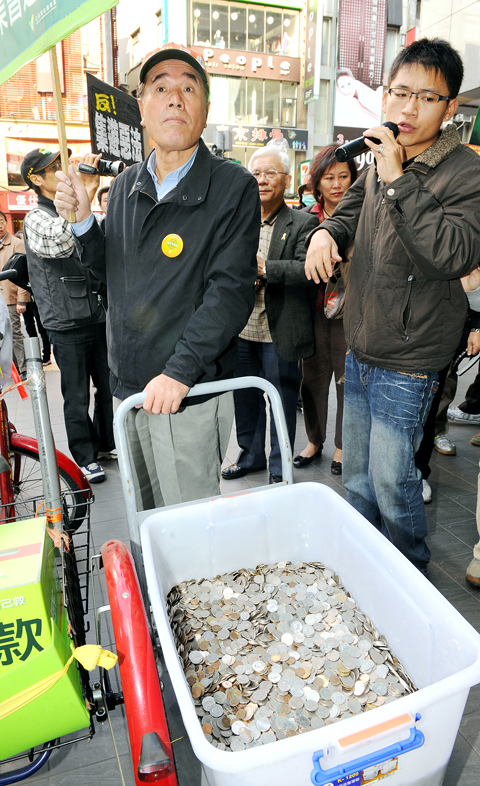Taiwan Referendum Alliance convener Tsay Ting-kuei (蔡丁貴) yesterday criticized the police for fining him for violating the Assembly and Parade Act (集會遊行法) when he walked around outside the Presidential Office with a donation box and some supporters on Wednesday.
Tsay went to Zhongzheng First Precinct police station on Wednesday to pay the fines he had previously received for violating the Act. Tsay had received tickets totaling more than NT$800,000 because he has been conducting a sit-in demonstration against the Assembly and Parade Act outside the Legislative Yuan since October 2008.
Because Tsay found that he did not have enough money to pay the fines, he decided to walk around with a donation box to raise money.

PHOTO: LO PEI-DER, TAIPEI TIMES
Tsay and his supporters were stopped by the police when they approached the side gate of the Presidential Office. They refused to stop and continued to walk around. They received a warning from the police, who said that Tsay and his supporters were in violation of the Assembly and Parade Act and they were asked to “disband.”
“We were only a few people walking on the street trying to raise money, it was neither an assembly nor a parade,” Tsay told the Taipei Times.
“It’s my freedom to wear whatever I want and take whatever I want when I walk on the street — the police have violated my freedom,” he said.
He said while there were other people with him, police officers only surrounded him.
“Is there a law that says that Tsay Ting-kuei cannot walk around the Presidential Office?” he asked. “They could arrest me if I had tried to walk into the Presidential Office, but I was merely walking on the sidewalk outside. The police abused their power.”
Taiwan Association for Human Rights secretary-general Tsai Chi-hsun (蔡季勳) agreed with Tsay.
Tsai said what had happened to Tsay showed that the Assembly and Parade Act is ridiculous and unnecessary.
“What Tsay Ting-kuei did would not be considered a violation of the Assembly and Parade Act if he did it elsewhere. What he did was declared illegal because the Presidential Office is a ‘sensitive’ place,” Tsai said. “This shows that the Act gives police too much power to decide what constitutes a violation of the law.”
On the other hand, police said the way officers acted was legal and justified.
“[Tsay and his supporters] walked in group — though there was quite a distance between them — and they held placards with slogans. Of course it was a demonstration,” said Yang Chih-chieh (楊志傑), the commander at the scene on Wednesday. “We may allow them to walk around elsewhere, but the area surrounding the Presidential Office is a restricted zone, so we had to stop them.”
Zhongzheng First Police Precinct Chief Inspector Jason Yu (于增祥) said he understood why many people do not like the Assembly and Parade Act.
“Whether it’s a good law or a bad law, as long as it’s still there we have to enforce it,” he said.

Alain Robert, known as the "French Spider-Man," praised Alex Honnold as exceptionally well-prepared after the US climber completed a free solo ascent of Taipei 101 yesterday. Robert said Honnold's ascent of the 508m-tall skyscraper in just more than one-and-a-half hours without using safety ropes or equipment was a remarkable achievement. "This is my life," he said in an interview conducted in French, adding that he liked the feeling of being "on the edge of danger." The 63-year-old Frenchman climbed Taipei 101 using ropes in December 2004, taking about four hours to reach the top. On a one-to-10 scale of difficulty, Robert said Taipei 101

Nipah virus infection is to be officially listed as a category 5 notifiable infectious disease in Taiwan in March, while clinical treatment guidelines are being formulated, the Centers for Disease Control (CDC) said yesterday. With Nipah infections being reported in other countries and considering its relatively high fatality rate, the centers on Jan. 16 announced that it would be listed as a notifiable infectious disease to bolster the nation’s systematic early warning system and increase public awareness, the CDC said. Bangladesh reported four fatal cases last year in separate districts, with three linked to raw date palm sap consumption, CDC Epidemic Intelligence

US climber Alex Honnold left Taiwan this morning a day after completing a free-solo ascent of Taipei 101, a feat that drew cheers from onlookers and gained widespread international attention. Honnold yesterday scaled the 101-story skyscraper without a rope or safety harness. The climb — the highest urban free-solo ascent ever attempted — took just more than 90 minutes and was streamed live on Netflix. It was covered by major international news outlets including CNN, the New York Times, the Guardian and the Wall Street Journal. As Honnold prepared to leave Taiwan today, he attracted a crowd when he and his wife, Sanni,

Taiwanese and US defense groups are collaborating to introduce deployable, semi-autonomous manufacturing systems for drones and components in a boost to the nation’s supply chain resilience. Taiwan’s G-Tech Optroelectronics Corp subsidiary GTOC and the US’ Aerkomm Inc on Friday announced an agreement with fellow US-based Firestorm Lab to adopt the latter’s xCell, a technology featuring 3D printers fitted in 6.1m container units. The systems enable aerial platforms and parts to be produced in high volumes from dispersed nodes capable of rapid redeployment, to minimize the risk of enemy strikes and to meet field requirements, they said. Firestorm chief technology officer Ian Muceus said